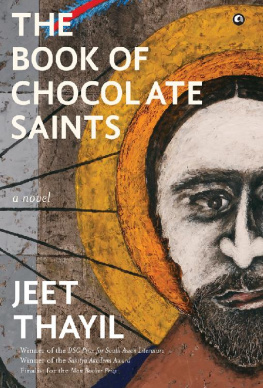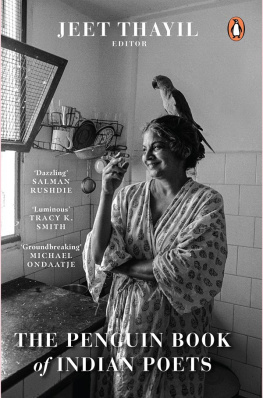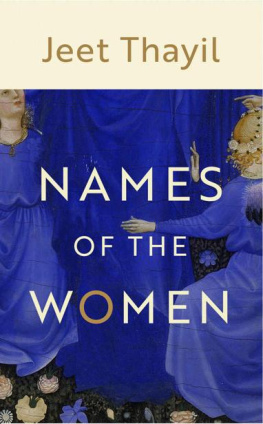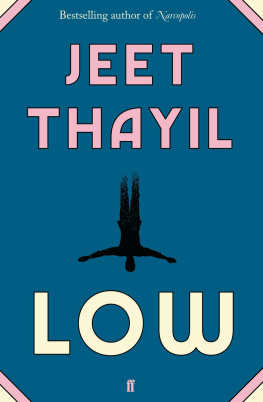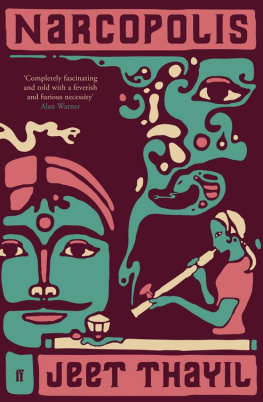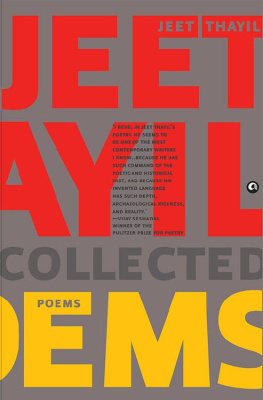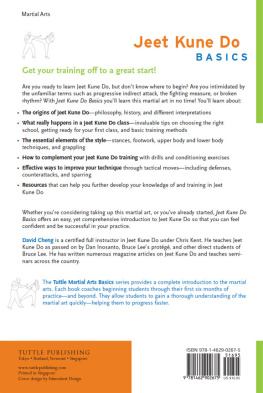THE BOOK OF CHOCOLATE SAINTS
Also by Jeet Thayil
FICTION
Narcopolis
POETRY
Collected Poems
These Errors Are Correct
English
Apocalypso
Gemini (Two-Poet Volume)
AS EDITOR
The Bloodaxe Book of Contemporary Indian Poets
Divided Time: India and the End of Diaspora
LIBRETTO
Babur in London
ALEPH BOOK COMPANY
An independent publishing firm
promoted by Rupa Publications India
Published in India in 2017 by
Aleph Book Company
7/16 Ansari Road, Daryaganj
New Delhi 110 002
Copyright Jeet Thayil 2017
All rights reserved.
This is a work of fiction. Names, characters, places and incidents are either the product of the authors imagination or are used fictitiously and any resemblance to any actual persons, living or dead, events or locales is entirely coincidental.
No part of this publication may be reproduced, transmitted, or stored in a retrieval system, in any form or by any means, without permission in writing from Aleph Book Company.
ISBN: 978-93-86021-03-8
1 3 5 7 9 10 8 6 4 2
For sale in the Indian subcontinent only.
This book is sold subject to the condition that it shall not, by way of trade or otherwise, be lent, resold, hired out, or otherwise circulated without the publishers prior consent in any form of binding or cover other than that in which it is published.
In memory of Dom Moraes
(1938-2004)
What is the mark that distinguishes the good from the bad, in works as in men?
Holiness is the only word for it.
Eric Gill
CONTENTS
PROLOGUE
Praise the broken world for it will vanish in a day and in a day be replaced by nothing. That was the citys message for the rainy season. A fire truck raced somewhere, followed by police jeeps, their beacons flashing on the store windows of Electric House. In the hush that followed, a horse carriage clattered to the seafront and a bus went past and the conductor blew his whistle. Under the covered arcades of Colaba Causeway the pavement shops pulled their shutters for the night and the street sleepers prepared their bedding. The lamps glowed dull and gold among the skinny trees in their dented metal skirts. Then the rain came again, dropping like pebbles against the tin roof of the verandah. Inside the apartment a womans unceasing tirade rose to its usual pitch of anguish. It was his wife shouting at the neighbours as she did most evenings; but tonight Newton Francis Xavier heard his mothers voice not his wifes and he felt his skin prickle with fear.
He stood at the bookcase and found his notebook and made a quick pencil sketch of a young woman in an untidy hotel room. He worked roughly, from memory, using a Japanese marker with a fine 0.1 tip, listening all the while to the sound of his wifes voice, Lulas famous Swiss-schooled voice coarsened now by smoke and drink and Hindi curses. He was ready to hide the sketch if he heard her footsteps approach from the next room, but she did not come. The tirade continued. When he was finished he put the notebook away at the back of a shelf stocked with history and biography, books he knew his wife would not disturb. In the notebook were fifty pages of drawings of the young woman in different rooms and moods, in poses both explicit and demure.
Later that night after his wife had gone to sleep he would transfer the notebook to the drawer of her bedside table where household bills lay among manuals and warranties. The sketches were preliminary efforts at a painting he was working on; they were expendable. In a day or two, after he had gone, she would open the drawer to look for the months electricity and water bills. She would find the notebook and the sketches and understand: after eighteen years of marriage, after threatening to do so a hundred times, he had finally left her.
Early the next morning he will shower and dress and Kuthalingam will take his suitcase and typewriter to the waiting taxi. He will leave the books collected over decades and he will leave the paintings his friends the artists have presented to him. He will leave on the shelf in the bedroom the copies of his own books and the copies of magazines, anthologies, and art journals that have featured his work. He will leave most of his clothes and his shoes, his shelf of bronze sculpture and his collection of Russian icons painted on wood. Before his wife is fully awake he will leave the house. He will not kiss her or take her leave. He does not trust himself to do this without mishap. He will shut the door and take the elevator two floors down to the street and there he will tip Kuthalingam for the last time and step into the taxi that will take him on the first leg of his journey out of Bombay. His flight will land in Delhi in the afternoon and the young woman in the drawings will be waiting at the airport. They will drive into the city and check into an overpriced hotel with an unashamedly colonial past and name. Over the next few days they will discuss the immediate future as they have done off and on for a year. Again he will ask her to accompany him to New York where he owns an apartment and a reputation. She will agree.
But all of that is yet to happen. For now, Sunday night lies before him. As the voice falls silent in the next room he returns to the window and the blank rain that breaks on the dead street; and because the young womans name is a talisman that will get him through the night he says it to himself, very softly, and then he says it once more.
Goody Lol.
book one
~
FROM THOSE TO WHOM MUCH IS GIVEN
SAINT MUMMY
the Lonely; flew things from buildings,
her flightless birds; could not abide
people, for sin she smelled inside;
knew knives & loud forebodings;
her bird bones bundled in aspic;
dragged by doctors; immune to harms;
held at distance her husbands charms;
holy woman preached Joan of Arc;
soul in extremis; hunter of devils
or flatly insane; maker of insane
son, whose company of brown saints
she rebuked; starved herself for thrills;
physician who could not heal herself;
poor memsahib who died in debt
one summer when the power died;
girl who wished she was someone else.
from The Book of Chocolate Saints: Poems (Unpublished)
Paulita Ribeiro, neighbour, interviewed by Dismas Bambai in Forgottem, Goa, February 2005
Until the day she went after him with a bread knife we thought his mother was the most ordinary woman in the world.
We called her Burial because she was always so cold and formal. My husbands joke, her real name was Beryl. She thought she was better than the rest of us poor campons because she was descended from a long line of doctors. She said her mother or maybe her grandmother was the first female doctor in the country. We didnt know she was mad until much later. The first time I thought about it, about her sanity I mean, was when she force-fed the poor old cook, shoved a tube into her mouth and poured in a mixture of honey and mustard. She did it quietly so the neighbours, meaning me, wouldnt hear. But Cook told the whole countryside. She said Burial would go from room to room, anything breakable she smashed to the ground or threw out the window. Cook said the servants locked themselves in the kitchen. After that bit of news nobody wanted to work at crazy Burials house, believe you me.



